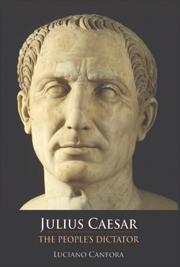Book contents
- Frontmatter
- Contents
- Translators' Note
- Acknowledgements
- Foreword
- PART I FROM SULLA TO CATILINE
- PART II FROM THE TRIUMVIRATE TO THE CONQUEST OF GAUL
- PART III THE LONG CIVIL WAR
- PART IV FROM THE CONSPIRACY TO THE TRIUMPH OF CAESARISM
- 29 Inklings of Conspiracy
- 30 ‘Iure caesus’
- 31 The Lupercalia Drama
- 32 The Dictatorship
- 33 Epicureans in Revolt?
- 34 The Hetairia of Cassius and the Recruitment of Brutus
- 35 A Conspirator's Realism: Cassius Settles for the Second Rank
- 36 Some Unexpected Refusals
- 37 Cicero – an Organiser of the Conspiracy?
- 38 The Serious Mistake of Dismissing the Escort
- 39 The Dynamics of the ‘Tyrannicide’
- 40 ‘Where's Antony?’
- 41 Caesar's Body: How to Turn Victory into Defeat
- 42 The Wind
- Chronology
- Bibliography
- Index
42 - The Wind
from PART IV - FROM THE CONSPIRACY TO THE TRIUMPH OF CAESARISM
Published online by Cambridge University Press: 05 August 2013
- Frontmatter
- Contents
- Translators' Note
- Acknowledgements
- Foreword
- PART I FROM SULLA TO CATILINE
- PART II FROM THE TRIUMVIRATE TO THE CONQUEST OF GAUL
- PART III THE LONG CIVIL WAR
- PART IV FROM THE CONSPIRACY TO THE TRIUMPH OF CAESARISM
- 29 Inklings of Conspiracy
- 30 ‘Iure caesus’
- 31 The Lupercalia Drama
- 32 The Dictatorship
- 33 Epicureans in Revolt?
- 34 The Hetairia of Cassius and the Recruitment of Brutus
- 35 A Conspirator's Realism: Cassius Settles for the Second Rank
- 36 Some Unexpected Refusals
- 37 Cicero – an Organiser of the Conspiracy?
- 38 The Serious Mistake of Dismissing the Escort
- 39 The Dynamics of the ‘Tyrannicide’
- 40 ‘Where's Antony?’
- 41 Caesar's Body: How to Turn Victory into Defeat
- 42 The Wind
- Chronology
- Bibliography
- Index
Summary
A fragment of Livy, most probably from book 116 (a ‘definitive’ portrait of Caesar following the account of his death), raised a question mark over Caesar's entire career. By citing it Seneca introduced a new angle, which has its own profound poetry – an analogy with the wind: ‘As things are, however, it could be said of winds what was commonly said of Julius Caesar, as reported by Titus Livy; it is uncertain whether it was better for the state that Caesar had been born or not.’ It would be wrong to read this as a hostile judgement on Caesar. Rather it stems from a state of profound perplexity: because nobody would categorically ‘condemn’ the wind, although everybody knows what destruction it can wreak. And in fact Seneca continues:
Indeed, whatever is useful and necessary from the winds cannot be balanced by the things which the madness of mankind devises for its own destruction. Even if they do cause harm by the wrongdoing of men who use them evilly, not on this account are the winds evil by nature. Actually, Providence and that god who is the organiser of the universe did not arrange to move the atmosphere by winds and to distribute winds from all directions (lest anything become barren because of inactivity) only so that we might fill up our fleets with armed soldiers to seize part of the deep waters and only so that we might seek out an enemy on the sea or even beyond the sea!
- Type
- Chapter
- Information
- Julius CaesarThe People's Dictator, pp. 344 - 348Publisher: Edinburgh University PressPrint publication year: 2007

